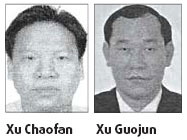A US court has sentenced two Chinese officials and their wives, who fled China eight years ago after hatching a plot to embezzle $482 million from Bank of China, to up to 25 years in prison.
A federal judge in Las Vegas sentenced Xu Chaofan to 25 years and Xu Guojun to 22 years in prison on Wednesday. The two were managers of Bank of China's Kaiping branch in Guangdong province.

Their wives were sentenced to eight years each, and the quartet was ordered to pay $482 million in restitution.
The four were found guilty of hatching a plot in 1991 and continuing their efforts to execute it even after fleeing to the US in 2001. They were arrested in the US in October 2004.
According to a statement from the US Department of Justice, prosecutors charged them with laundering money through Hong Kong, Canada and the US.
A third banker, Yu Zhendong, was part of the conspiracy, and fled to the US in 2001, too. But he pleaded guilty and was later deported to China and jailed for 12 years in 2006.
During the trial in Las Vegas, the court heard how the two Xus created a series of shell corporations in Hong Kong that were used to funnel cash into personal bank and investment accounts.
Some of the money ended up on gaming tables in Las Vegas casinos, where the accused would frequently lay bets of up to $80,000.
Evidence showed the Xus' wives helped them launder the proceeds of the fraudulent scheme and violated US immigration laws by entering the country illegally and then securing US citizenship through fraudulent marriages with US citizens.
The two men were also convicted on three counts each of visa fraud.
The verdict shows the border is not an obstacle for justice to prevail, US law enforcement officers said.
"We will hold fully accountable those foreign nationals who abuse the financial systems of their home countries and who then, by fraudulent means, seek to live richly off their ill-gotten gains in the US," US government prosecutor Lanny Breuer said in the statement.
"Financial crimes like these know no borders," Kenneth Kaiser, director of FBI Criminal Investigative Division, said. "By partnering in investigations such as this one, the FBI and our law enforcement partners in the US and abroad can combine our collective resources to most effectively attack this worldwide criminal threat."
Huang Feng, a law professor in Beijing Normal University and an expert on extradition, said the case is an example of successful cooperation between law enforcement agencies of China and the US.
Since China does not have an extradition treaty with the US it is very difficult to bring back Chinese suspects to stand trial in the country, Huang said. The deportation of Yu was an exceptional case because he pleaded guilty and volunteered to return to China.
"But today's verdict shows that even if we cannot bring corrupt officials back to China, they can still be jailed through the joint efforts of the two countries' law enforcement agencies," Huang said.
"It's a good example of how to deal with similar cases."
The two Xus and their wives will be jailed in the US, he said, but it is also possible that they could be deported to China to serve their sentences.
China has been pushing the US and Canada to sign extradition treaties because scores of corrupt Chinese officials have fled there. A number of officials have fled to European countries such as the UK, Germany and the Netherlands, too, according to the Supreme People's Procuratorate.
Ministry of Public Security figures released in 2006 show more than 800 people accused of embezzling about 70 billion yuan ($10.26 billion) had fled abroad, and 500 of them were still at large. But experts say the actual number is much higher.
Huang said the death penalty may be the biggest obstacle for some countries to sign an extradition treaty with China, but it should not deter the US because it too has not abolished capital punishment.
In fact, "US Congress' prejudice against China's legal system and human rights has been hindering the progress," he said.
(China Daily May 8, 2009)